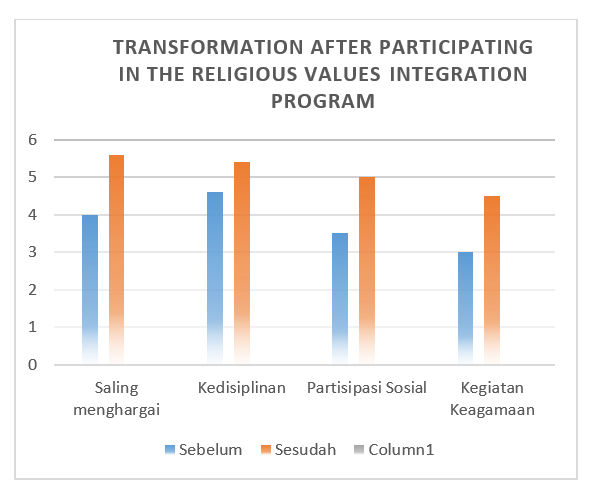Integration of Religious Values to Reduce the Decline of Adolescent Ethics in High School
DOI:
https://doi.org/10.51574/ijrer.v4i4.3672Keywords:
Adolescent, Ethics, High School, Religious ValuesAbstract
Ethical decline among adolescents is one of the main challenges in education today. This study aims to examine how the integration of religious values into moral education can mitigate the ethical decline among adolescents at High School, a boarding school that combines religious and general education. This research used a case study approach with qualitative methodology, involving participant observation, in-depth interviews with teachers and students, and documentation. This research was conducted at Nurul Jadid High School. The results indicate that the integration of religious values into the curriculum and extracurricular activities plays a significant role in improving students' morals and ethics, particularly in the areas of discipline, respect, and responsibility. Furthermore, the role of teachers as moral role models and a positive school environment also influence the successful internalization of religious values in students. However, challenges in its implementation include the gap between the teaching of religious theory and the implementation of these values in daily life. This study recommends a more contextual and integrative approach to address this challenge and strengthen religion-based moral education.
References
Alsaleh, A. (2024). The impact of technological advancement on culture and society. Scientific Reports, 14(1), 32140. https://doi.org/10.1038/s41598-024-83995-z
Amin, H. (2024). Value-based frameworks and peace education in faith-neutral, faith-based and faith-inspired schools in Islamabad: A comparative analysis. Journal of Peace Education, 21(1), 54–81. https://doi.org/10.1080/17400201.2023.2289655
Andrei, O. (2023). Enhancing religious education through emotional and spiritual intelligence. HTS Teologiese Studies/Theological Studies, 79(1). https://www.ajol.info/index.php/hts/article/view/245602
Astuti, M., Herlina, H., & Ibrahim, I. (2024). Pendidikan Islam dan perannya dalam membentuk karakter mahasiswa. Jurnal Visionary: Penelitian Dan Pengembangan Dibidang Administrasi Pendidikan, 12(1), 77–88. https://doi.org/10.33394/vis.v12i1.9821
Banafsa, N. C. G., Nurjannah, N., & Laksana, M. Z. F. (2025). Strategi Membangun Budaya Religius Di Sekolah Dalam Membentuk Karakter Sosial Pada Peserta Didik. Jurnal Multidisiplin Ilmu Akademik, 2(3), 490-500. https://doi.org/10.61722/jmia.v2i3.4914
Birhan, W., Shiferaw, G., Amsalu, A., Tamiru, M., & Tiruye, H. (2021). Exploring the context of teaching character education to children in preprimary and primary schools. Social Sciences & Humanities Open, 4(1), 100171. https://doi.org/10.1016/j.ssaho.2021.100171
Chan, C. K. Y., & Luo, J. (2022). Towards an inclusive student partnership: rethinking mentors’ disposition and holistic competency development in near-peer mentoring. Teaching in Higher Education, 27(7), 874–891. https://doi.org/10.1080/13562517.2020.1751606
Chiril, P., Pamungkas, E. W., Benamara, F., Moriceau, V., & Patti, V. (2022). Emotionally informed hate speech detection: a multi-target perspective. Cognitive Computation, 14(1), 322-352. https://doi.org/10.1007/s12559-021-09862-5
Coyne-Foresi, M., & Nowicki, E. (2021). Building connections and relationships at school: Youth reflect on mentoring their younger peers. The Journal of Early Adolescence, 41(2), 332-362. https://doi.org/10.1177/0272431620912472
Damanik, M. T. R., Tarigan, M. R. M., Qothrunnada, A., Sukana, D. S., & Siahaan, N. A. S. (2024). Pergaulan bebas generasi muda dalam perspektif Al-Qur’an. Al-Muhajirin: Jurnal Pendidikan Islam, 1(1). https://doi.org/10.63911/8hwd6x38
Dehshiri, A. S. H. (2022). Moral education of adolescents based on religious teachings. International Multidisciplinary Journal of Pure Life (IMJPL), 9(32), 99-145.
Dinata, C. D. W., & Ali, M. (2024). Strategi Inovatif Guru Pendidikan Agama Islam dalam Membentuk Karakter Disiplin Peserta Didik: Sebuah Kajian dengan Pendekatan Fenomenologi. Didaktika: Jurnal Kependidikan, 13(1), 1237-1246. https://doi.org/10.58230/27454312.561
Hartati, D. (2025). Strategi Pendidikan Karakter Dalam Dunia Pendidikan Di Indonesia. Innovative: Journal Of Social Science Research, 5(1), 3966-3976. https://doi.org/10.31004/innovative.v5i1.18082
Haryanto, S., Rizki, S., & Fahdilah, M. (2023). Konsep SQ: Kecerdasan Spiritual Menurut Danah Zohar Dan Ian Marshal Dan Relevansinya Terhadap Tujuan Pembelajaran PAI. Paramurobi: Jurnal Pendidikan Agama Islam, 6(1), 197–212. https://doi.org/10.32699
Holid, M., Rozi, F., & Baharun, H. (2025). Principals’ Role in the Application of Reward and Punishment Systems for Promoting Student Discipline in Pesantren-Based Schools. Journal of Educational Management Research, 4(2), 293-307. https://doi.org/10.61987/jemr.v4i1.877
Huda, M. (2024). Strengthening religious moderation through the core values of Islamic boarding school education. Al-Hayat: Journal of Islamic Education, 8(1), 59-71. https://www.alhayat.or.id/index.php/alhayat/article/view/458
Islamic, G., Ishaq, M., & Dayati, U. (2024). Character education through philosophical values in traditional Islamic boarding schools. Kasetsart Journal of Social Sciences, 45(1), 31-42. https://so04.tci-thaijo.org/index.php/kjss/article/view/269466
Jannah, A. (2023). Peran pendidikan agama Islam dalam membina karakter religius siswa sekolah dasar. Pendas: Jurnal Ilmiah Pendidikan Dasar, 8(2), 2758-2771.
Kamila, A. (2023). Pentingnya pendidikan agama Islam dan pendidikan moral dalam membina karakter anak sekolah dasar. Al-Furqan: Jurnal Agama, Sosial, Dan Budaya, 2(5), 321-338. https://publisherqu.com/index.php/Al-Furqan/article/view/535
Li, W., Manoharan, P., Cui, X., Liu, F., Liu, K., & Dai, L. (2023). The effects of musical feedback training on metacognition and self-directed learning. Frontiers in Human Neuroscience, 17, 1304929. https://doi.org/10.3389/fnhum.2023.1304929
McLoughlin, N., Jacob, C., Samrow, P., & Corriveau, K. H. (2021). Beliefs about unobservable scientific and religious entities are transmitted via subtle linguistic cues in parental testimony. Journal of Cognition and Development, 22(3), 379-397. https://doi.org/10.1080/15248372.2020.1871351
Moorthy, R., Selvadurai, S., Gill, S. S., & Gurunathan, A. (2021). Sustainable societal peace through the integration of bioethics principles and value-based education. Sustainability, 13(6), 3266. https://doi.org/10.3390/su13063266
Mukherjee, S., & Ghosh, S. (2022). Enhancing effectiveness of values and ethics education through spirituality. Journal of Management, Spirituality & Religion, 19(3), 275-301. https://doi.org/10.51327/CHXM7253
Mulyana, R. (2023). Religious moderation in Islamic religious education textbook and implementation in Indonesia. HTS Teologiese Studies/Theological Studies, 79(1), 8592. https://doi.org/10.4102/hts.v79i1.8592
Munif, M., & Faizin, F. M., & Aliyah, N.(2024). Habituasi Pendidikan Akhlak dalam Membentuk Karakter Siswa di Sekolah Berbasis Pesantren. Jurnal Tarbawi, 15(2), 31-50.
Nuryadi, S., Prayitno, I., & Kumoro, D. F. C. (2025). A Model of Character Development for Santri: The Role of Ethical Leadership, Value Development, and Character-Based Learning Mediated by Students’ Experiences. International Journal of Social and Management Studies, 6(1), 15-23. https://mail.ijosmas.org/index.php/ijosmas/article/view/463
Rozi, F., Mufidah, A. L., Munif, M., & Qodriyah, K. (2025). Internalizing Pesantren Values to Prevent Violence Among Santri. Andragogi: Jurnal Pendidikan dan Pembelajaran, 5(1), 71-87.
Rozi, F., Hasanah, H., Rohmah, T. L., Jannah, S. N., & Maulani, R. (2025). Transformasi Pendidikan Karakter dalam Mewujudkan Kesadaran Diri Siswa. Pedagogik Journal of Islamic Elementary School, 132–148. https://doi.org/10.24256/pijies.v8i1.6400
Skrefsrud, T. A. (2022). A proposal to incorporate experiential education in non-confessional, intercultural religious education: Reflections from and on the Norwegian context. Religions, 13(8), 727. https://doi.org/10.3390/rel13080727
Villarejo-Carballido, B., Pulido, C. M., de Botton, L., & Serradell, O. (2019). Dialogic model of prevention and resolution of conflicts: Evidence of the success of cyberbullying prevention in a primary school in Catalonia. International Journal of Environmental Research and Public Health, 16(6), 918. https://doi.org/10.3390/ijerph16060918
Watung, S. R., Sunarno, S., Fitriyah, A. W., Saputra, N., & Abas, Y. (2023). School Principals as Leaders in Fostering Attitudes of Religious Tolerance in Schools. Nidhomul Haq: Jurnal Manajemen Pendidikan Islam, 8(3), 424-436. https://doi.org/10.31538/ndh.v8i3.4078
Zakwan, L., Marzuki, M. F., & Gusmaneli, G. (2024). Menginspirasi Generasi Muda: Pendekatan Kreatif Dalam Pembelajaran Pendidikan Agama Islam. IHSANIKA: Jurnal Pendidikan Agama Islam, 2(2), 223-236.
Zalukhu, A. (2025). The Role of Christian Education in Building Spiritual Resilience Among Adolescents Amid Peer Influence. International Journal of Christian Education and Philosophical Inquiry, 2(1), 46-60. https://doi.org/10.61132/ijcep.v2i1.154
Zellma, A., & Mąkosa, P. M. (2024). Strengthening the Resilience of Pupils through Catholic Religious Education in Poland: From Theory to Practice. Religions, 15(10), 1153. https://doi.org/10.3390/rel15101153
Zuhri, A., Ramírez-Coronel, A. A., Al-Hawary, S. I., Dwijendra, N. K. A., Muda, I., Pallathadka, H., ... & Sunarsi, D. (2023). Evaluation of the role of Islamic lifestyle in communication skills of Muslim couples. HTS Teologiese Studies/Theological Studies, 79(1). https://doi.org/10.4102/HTS.V79I1.8185

Downloads
Published
How to Cite
Issue
Section
License
Copyright (c) 2025 Fathor Rozi, Vicky Amalia Bulqis, Moh. Fachri

This work is licensed under a Creative Commons Attribution-ShareAlike 4.0 International License.









1.png)













